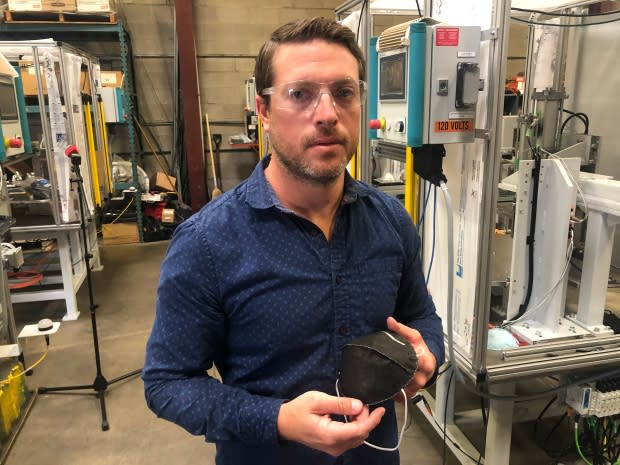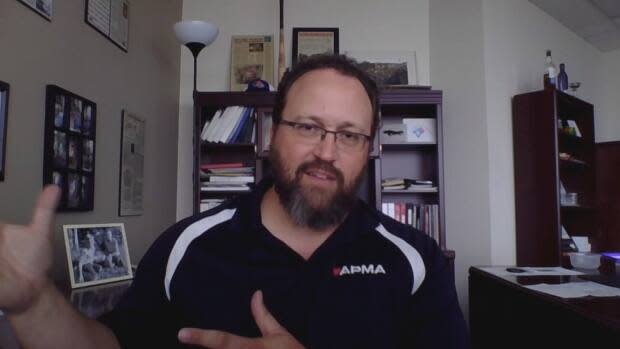The pandemic pivot: A check-in with companies that shifted to help during COVID-19
At the onset of the novel coronavirus, public officials scrambled to find ventilators and personal protective equipment to care for the sick and keep health care workers safe. While they were looking abroad to fill many of the needs — domestic businesses, including some in Windsor, stepped in to build capacity here at home.
Many of these businesses were seeing a big disruption in their day-to-day affairs due to the virus and a shift in focus became a temporary way to pitch in for some, while others found a new niche.
CBC Windsor checked in with some of those businesses to see how the pandemic pivot is going.
Masks
At the start, the demand for medical grade masks was high. Health officials went to great lengths to secure the vital piece of equipment to help keep workers safe.
Early on, one Windsor company, Harbour Technologies, jumped in to try and create what the company said would be Canada's first certified N-95 mask. Normally the company services the nuclear industry.
There are still some regulatory hoops for the company to jump through; getting a certification from the National Institute for Occupational Safety and Health in the U.S. to carry the N-95 distinction is still a couple of months off.
That will certify the mask removed 95 percent of airborne particles from the air during the institute's test. For now, it is considered a C-95 mask, where "C" stands for civilian.
In the meantime, the company has four lines built that can pump out more than 9,000 masks a day. Two of them will serve the medical market, one is for the industrial market and one is for the commercial market.

"These first machines will be having products off of them within a month and our other machines will probably be by end of October," Glover said.
While the company waits for its N95 certification, a consumer-facing partnership, called Atmis Protective equipment, is selling a different line of masks and a face shields.
"Primarily the Atmis product line is going to be suited for civilian and individual use outside of medical, there are some applications for medical use as well but the initial products and designs we're coming out with are civilian use," Trevor Pare, of Atmis, said.
The production lines are now being pieced together at Atmis' Windsor facility and the company is poised to start filling orders from across the country, Glover said.
"I think maybe one day when we look back and say 'Hey this was a great idea' but for now we're just focused on getting a good product out in a timely fashion," Glover said.
Hand sanitizer
It was a hustle for the Hiram Walker & Sons distillery in Windsor to get all the ingredients needed for hand sanitizer when the need for it became apparent in March.
"It was very hectic at the very beginning," Han Ha, manufacturing manager, said. "The dramatic demand in hand sanitizer, there was no supply for it, so there was a huge shortage and for us we wanted to fill a little bit of that supply space."

The company has produced more than 200,000 litres of sanitizer since it began, which is a drop in the bucket next to the 44 million litres of different types of alcohol the distillery produces annually.
The sanitizer was donated around town to different entities in Windsor and Toronto that needed it.

"I think everybody who contributed to this is very proud that we could help out in any way that we could," Ha said.
The capacity to produce the sanitizer at the distillery still exists though the need has gone down tremendously, he said.
"With the re-opening of the schools, we anticipate a little bit of a spike so we're prepared for that," Ha said.
Ha added that they would also be better prepared to ramp up production if an urgent need were to arise again.
"We will try to support the community as best we can."
Auto parts
Automotive companies and the industry that feeds them parts also saw rough roads ahead as plants were temporarily closed due to concerns about the virus.
But a call went out for those companies to use their machine knowledge and capacity to help fill shortages of ventilators as well as build machines that could produce things like gowns and other personal protective equipment.
"We replaced about one percent of our industrial capacity with this," Flavio Volpe, the president of the Automotive Parts Manufacturing Association, said. "Were it not for the capacity of this industry, we would not have been able to do this."

About 165 companies, who are members of the association, and other businesses in Windsor answered the call, according to Volpe. He said from his count about 25 of them ended up with contracts.
"Most, if not all of those contracts have been optioned as well that if we end up in a need in a second wave that we'll be there to deliver for those who needs them," Volpe said.
He said the for-profit companies spent money they didn't have to partner with the government and try to find solutions.
"A lot of these businesses are the biggest employer in their towns, so if they didn't step up then who would," Volpe said.

